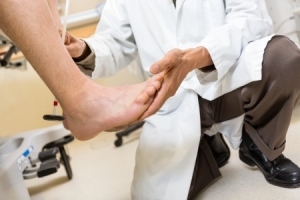Connect With Us
Blogs
Displaying items by tag: common foot problems
3 “Frightening” Foot Diagnoses
At Superior Foot & Ankle Care Center, we strive to make your podiatric visits as non-scary as possible. Certain foot problems, however, have names that sound quite frightening, but in reality, are fairly common and easily treated. Below are three that might cause you to be alarmed:
Subungual hematomas—not only does this condition sound gruesome, its appearance may give you a scare as well. Its telltale sign is a black toenail. No plague here, however. The black color of the nail is caused by blood pooling under the nail—most often the result of an injury to the toe, like a bad stubbing or a heavy object falling on your foot. Black toenails are also a frequent occurrence among patients who are runners. The repetitive pounding of the toes up against the front of the shoe can result in black nails. In most cases, subungual hematomas will clear up on their own. You might want to get your feet measured to make sure you are wearing shoes that are big enough for your feet.
Onychomycosis—this ten-dollar term is another way of saying you have toenail fungus. Although you may feel that your toe looks like it belongs in a horror movie—discolored, edges that are crumbling and breaking off and odd spots on the nail—fungal nails are often not painful at all. In fact, that’s partly why patients don’t bother getting them evaluated. Fungal infections can spread to other toes and other parts of the body, however, so it’s best to have our podiatrists, Dr. Victoria M. Foley or Dr. Constance Ornelas evaluate a funky looking nail and prescribe the best treatment.
Tenia pedis—you probably know this condition better by its more common name, athlete’s foot. This common foot fungus can be unbearably itchy and cause a red rash, flaky skin and even oozing blisters if left untreated. You get athlete’s foot by coming in direct contact with the fungi and most cases can be prevented by keeping your feet covered in public places and not sharing socks, shoes, or other items that touch another person’s feet.
No matter how bizarre your podiatric symptoms may be, the best course of action is to contact our Long Beach office for an appointment as soon as possible by calling: (562) 420-9800.

